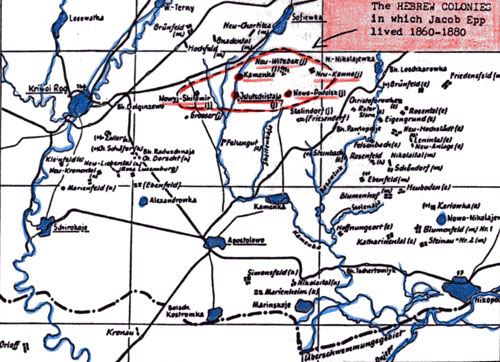A Mennonite minister, Joseph Epp, lived in the Hebrew Colonies between 1860 and 1880 serving as a model farmer, advisor and Mennonite church official. He was not only a moral advisor but had considerable civic authority. He was also the chairman of the church council whose jurisdiction included responsibility for Jewish-Mennonite relations. This rare diary gives insight and information about the Kherson Jewish Colonies shown below.
|
|
|
Kherson Colonies where the Mennonite minister Jacob Epp lived 1860-1880: Novo-Podolsk, Nowyj Shitomir, New Kowno Novi Witebsk, Kamenka and Islutschistaja (outlined in red above). |
Excerpt from the introduction to the two part article "The Diary of Jacob Epp 1860 - 1880 by John B. Toews that appeared in the Spring and Summer 1982 issues of the Journal of the American Historical Society of Germans from Russia.
"Before the October Revolution (1917) volost and village offices among the Mennonite colonies in Russia were literally bursting with records and accounts of every description. Two events radically altered this state of affairs. The revolution brought civil war and with it a series of occupations by anarchist bands or military contingents of the Red or White army. In some instances records were dumped on the street and burned, in others used as wrapping paper for local street markets. The records covering over a century of Mennonite live in Russia vanished forever. Only those in government offices or private hands survived. none of these provided much information on nineteenth century church and village life.
"The surviving portion of the diary of the minister Joseph Epp, on deposit at the Mennonite Heritage Centre in Winnipeg, Manitoba, affords a rare opportunity to enter into the Russian Mennonite world of that era. Epp lived in the so-called "Hebrew Colonies" in the region south of Sofiyevka and east of Krivoy Rog. A number of Mennonite farmers from the Chortitza settlement had been located in these Jewish villages to serve as model farmers of their less experienced Jewish Neighbors. Each village wa assigned a given number of Mennonite families, who were tied into the local economic and agrarian patterns. Religiously and culturally, however, each group remained very separate. Epp's diary pictures Mennonites life as it might have found expression in any self-contained Mennonite settlement."
A full transcript of this article may be obtained by contacting the editor.
| A Mennonite in Russia: the diaries of Jacob D. Epp
1851-1880, translated and edited with an introduction and analysis by Harvey
L. Dyck. Toronto: University of Toronto Press, 1991; see also Dyck's separate
account of the Judenplan, "Landlessness in the Old Colony: the Judenplan
experiment 1850-1880. In John Friesen ed., Mennonites in Russia. Winnipeg:
CMBC Publications, 1989, 183-201. For more information on the Mennonites in Russia: | |
| Urry, James, None but Saints: the transformation of
Mennonite life in Russia,1789-1889. Winnipeg: Hyperion Press, 1989. |
Research Contact: Chaim
Freedman
This page maintained by Max Heffler
Updated Thursday March 07 2024. Copyright © 1999 [Jewish Agricultural
Colonies of the Ukraine]. All rights reserved.

